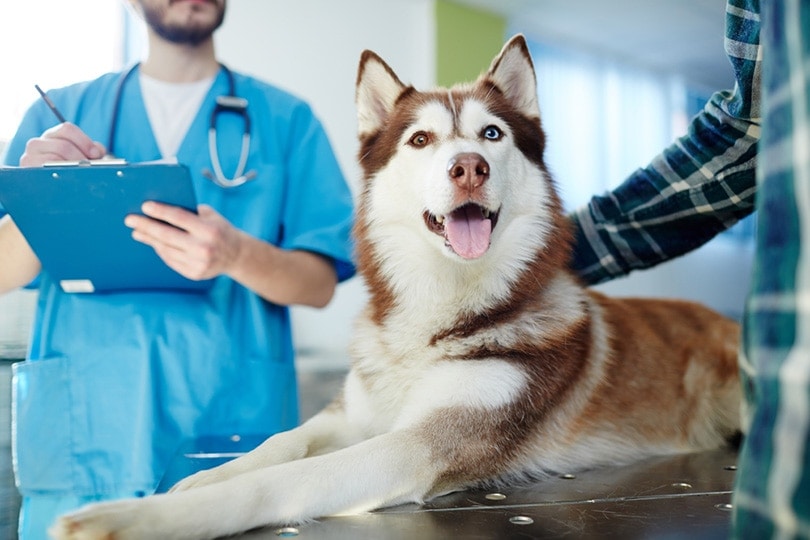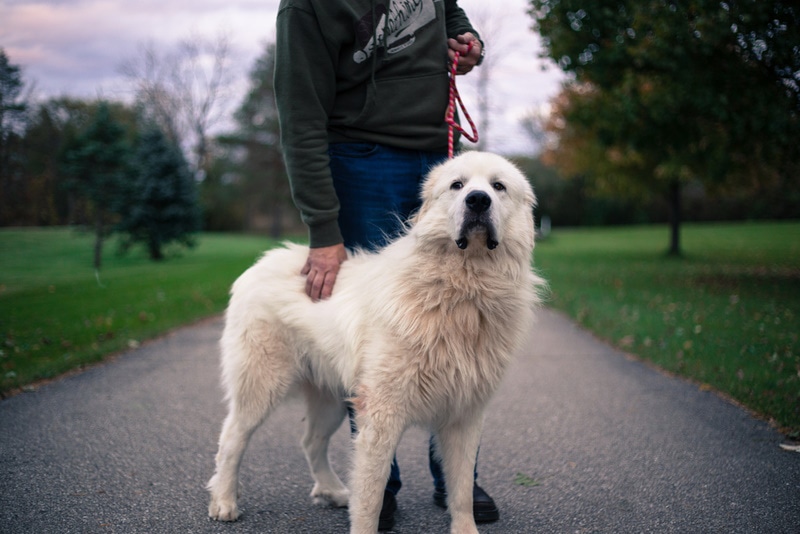Do Antibiotics Make Dogs Tired? Vet-Reviewed Side Effects & FAQs
Updated on

Healing takes a lot of energy. When you get sick, your body focuses its resources on getting over whatever is ailing you. It’s the same for your dog. If you’re wondering if your pup is sleeping a lot because of the antibiotics your pet is taking, the answer is probably not. It’s more likely that your dog is exhausted from being ill with the meds giving it the ability to fight the disease. Very few antibiotics list drowsiness as a side effect although it is anecdotally reported.
Antibiotics are one of the most commonly prescribed medications for pets. They are a powerful class of drugs, which makes understanding their use important. We’ll discuss some of the primary ones your vet may recommend. We’ll also delve into what are some typical side effects.
The Purpose of Antibiotics
The primary purpose of antibiotics is to treat bacterial infections. Bacteria are usually one-celled organisms that invade an organism’s body by various means. They reproduce rapidly and often synthesize harmful toxins that can cause further complications. Antibiotics have no effects on viral, fungal, and most protozoal infections.
Antibiotics don’t work for viruses because these organisms reproduce by attacking the host’s cells and growing within them. Killing these pathogens essentially means destroying the cells, too. Different classes of drugs are more appropriate for treating viral, fungal, and protozoal conditions. The same thing applies whether you’re talking about humans, dogs, or other pets.

Common Canine Antibiotics
You may recognize the names of some of the most commonly prescribed canine antibiotics. After all, dogs can be infected by many of the same bacteria as us, so it makes sense some drugs would work for both. It is important to note that not all human antibiotics can be used in pets. Medications you may see include:
- Trimethoprim Sulphonamide
- Clindamycin
- Chloramphenicol
- Amoxicillin-clavulanic acid
Each one has specific uses for different body systems and types of bacteria. For example, amoxicillin-clavulanate acid is often prescribed for wound healing, whereas trimethoprim sulphonamide can be effective for urinary tract infections. They also vary in their strength and side effects. Antibiotics require a veterinarian to have examined your pet and prescribe them for use.
If you need to speak with a vet right now but can’t get to one, head over to JustAnswer. It’s an online service where you can talk to a vet in real time and get the personalized advice you need for your pet — all at an affordable price!

Side Effects of Antibiotics FAQs

Can Antibiotics Hurt My Pet?
Antibiotics have one purpose: to kill bacteria to help your pet recover from infection. Unfortunately, sometimes there are side effects. As the good bacteria in the gut can also be affected by the antibiotic, an upset digestive system is a common side effect. Using probiotics whilst on antibiotics can help to reduce this. Vomiting and diarrhea are the most commonly reported side effects.
Will my dog pee more on these drugs? Some pet owners may wonder, do antibiotics make dogs pee more? Many medications recommend giving your dog plenty of water. The reason is to stop the tablets from getting stuck in the esophagus, resulting in distress. If your pet has diarrhea complications it can cause dehydration in your pup. They may drink more to counterbalance the fluid loss. If your pet is drinking more water, it will urinate more.
Can a Dog Be Allergic to Antibiotics?
Another possible side effect is an allergic reaction. It typically manifests itself quickly with hives, a skin rash, or swelling. It can rarely become a medical emergency in some pets. If you notice these symptoms in your dog, get your pup to the veterinary clinic immediately.
What Else Should I Know About Antibiotics?
Some of the more powerful antibiotics can cause neurological symptoms, such as lethargy, loss of appetite, or even balance problems but this is not common. That makes the choice of antibiotic for the infection, along with the necessary monitoring very important. Nevertheless, it’s imperative to follow your veterinarian’s instructions to the letter and complete the treatment cycle as prescribed.
Ask your veterinarian before deciding to stop giving antibiotics. Be vigilant for new signs and symptoms and discuss with your veterinarian if you notice any deterioration in your pet.
Using Human Antibiotics for Dogs

If your doctor prescribed you or your child amoxicillin, you might be tempted to give your dog some of your leftover meds. We strongly urge you not to diagnose and treat your pet on your own. One of the primary tenets of the American Veterinary Medical Association (AVMA) is the proper diagnosis of an animal presenting symptoms of a disease. That means determining if antibiotics are even necessary to avoid overuse.
Many conditions cause non-specific symptoms, such as vomiting. Many different problems can cause the sign and it is not a specific illness by itself. The other thing to bear in mind is antibiotic resistance. That is the focus of several international organizations, including the World Organization for Animal Health (OIE). Wise use of these medications is imperative to sustaining their viability as bacterial treatments for both pets and humans and reducing the risk of so-called superbugs.
The other question to consider is, can a dog overdose on antibiotics? According to the Pet Poison Helpline, the answer is a resounding yes. Each medication has a specific dosing range and side effects can be seen depending on the antibiotic used. A pup taking more than that amount is at a greater risk for complications.
Conclusion
Antibiotics are life-saving drugs when used as prescribed. They can give your dog the added boost to fight bacterial infections. That battle will likely wear your pup out and make your pet more tired than usual. While the antibiotic may not cause sleepiness directly, it can play an indirect role as your pooch recovers.
Be sure to keep an eye on your pet for other symptoms or side effects.
Featured Image Credit: ivanovgood, Pixabay











